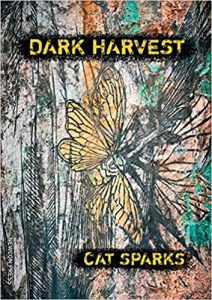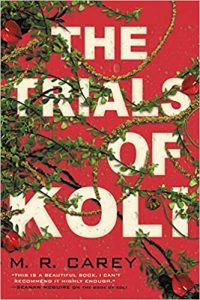Gary K. Wolfe Reviews Dark Harvest by Cat Sparks
 Dark Harvest, Cat Sparks (NewCon 978-1-912950676, $15.99, 244pp, tp) July 2020.
Dark Harvest, Cat Sparks (NewCon 978-1-912950676, $15.99, 244pp, tp) July 2020.
You only need to read a handful of Cat Sparks’s stories before you start feeling the need for some shade and a nice margarita. The bleak, sunbaked landscapes of her novel Lotus Blue are again invoked in her collection Dark Harvest, not only in stories set more or less in that same far-future Australia (“Hot Rods”, “Dragon Girl”, “Jericho Blush”), but in shorter-term futures dotted with ruins and rusted-out machines (“Fata Morgana”), and even in the rare tale set on another planet. In the latter story, “Dark Harvest”, a combat team is sent to the planet Litany, barren except for a ring of vegetation around the equator, to protect the interests of a pharmaceutical corporation which cultivates a dangerous patented weed there. As with many of Sparks’s characters, the team is made up of working-class misfits – “folks with bad credit ratings, reputations, attitudes or issues” – who sometimes talk as though they’d stepped out of a classic Astounding story from decades past. “When are we getting off this stinking rock?” one complains after a colleague has been evacuated after an accident in which his severed foot was reattached backwards by a malfunctioning medical bot, which in turn is blown to shreds after the commander shoots it with his blaster.
Other characters may include lowly cleaning ladies, such as the apartment cleaner given a series of inexplicable tasks in “Prayers to Broken Stones” or the former bureaucrat in “Before Dominica”, reduced to cleaning offices in a grim, violent future Sydney, where she occasionally finds dead bodies and never dares venture out to go home before daylight. The young drag racers in “Hot Rods” hope vainly to escape from their dying small town in an Australia devastated by global warming and economic collapse, but only a secret government installation seems to offer any hope of employment. In “Jericho Blush” – one of the stories set in the Lotus Blue future – young scavengers hoping to score some booty from an abandoned company town find themselves trapped by a plant-like defensive nano weapon which erupts from the ground in fleshy tentacles that seem to absorb people and machines alike, something of a cross between a Dune sandworm and the earthworm monsters of the Tremors franchise. When it’s useful for making her point, Sparks doesn’t hesitate to deploy this sort of iconography from SF film, and her stories are peppered with giant battle mechs, ominous drones, and Robocop-like body armor.
Sparks also makes effective use of the kinds of characters that remain too rare in SF, such as the aging scientist Bethany in “Fata Morgana”, whose wisecracking war machine (which she helped design) manages to rescue her and deliver her to the hardscrabble settlement of the title, where she passes along crucial information to a girl named Nadeen, who, in her own way, wants to learn how to shape a better future. “You Will Remember Who You Were” takes on the future of artistic expression, featuring a performance artist (with the wonderful name Amaryllis Storm-petrel) and a guerilla artist recreating the identity of Banksy in a decadent, self-indulgent society. Some of her characters are more hapless than they think they are, such as an AI-enhanced assassin searching for the assigned victim on a Norwegian ferry ship, who turns out to be in for an ironic surprise. The ersatz sailing captain in “Hacking Santorini” – the one original story in the collection, and one of the most memorable – barely manages a living in a world devastated by the “88-minute war,” and learns an unexpected lesson when a gaggle of wedding parties hires her boat to visit the long-shunned island of Santorini, from which no one has returned in years.
Like “Hacking Santorini”, two of the other most memorable stories also feature settings at a far remove from Sparks’s blasted desertscapes. “And the Ship Sails On” takes place on an enormous cruise ship wandering the oceans long after environmental disasters have wiped out cities like Sydney and left billions dead. The story combines Ship of Fools-type social satire – the “top deck” passengers still rigidly enforce their elite status, even long after their gourmet foods have run out, and the ship is called the Federico Fellini, with ballrooms named after Zsa Zsa Gabor and Sophia Loren – with a bit of nautical horror (some gigantic sea creature seems to be stalking the ship) and even jungle adventure, as one of the ship’s lower decks has become so overgrown with vegetation that a crusty old figure named Doc leads hunting expeditions through the undergrowth. Like some of Sparks’s other tales, it’s a bit overpacked, but intriguing and inventive. Probably her most controversial story is also one of the least characteristic: “No Fat Chicks” describes a pandemic of “infectobesity” in which a mutated virus attacks only women, resulting in uncontrolled weight gain. Apart from the odd resonance in reading about TV coverage of “pedestrians shuffling, faces obscured beneath medical masks,” the story takes some considerable risks by exploring the implications not only for traditional gender roles – which inevitably come to involve VR brothels for men – but for trans and intersex people and “ladyboys.” Sparks’s brief afterword says the story is “the most universally despised thing I have ever written,” even though it went on to win a Ditmar. There’s something to be said for climbing far out on a limb, and Sparks shows us how to do that repeatedly in this provocative collection.
Gary K. Wolfe is Emeritus Professor of Humanities at Roosevelt University and a reviewer for Locus magazine since 1991. His reviews have been collected in Soundings (BSFA Award 2006; Hugo nominee), Bearings (Hugo nominee 2011), and Sightings (2011), and his Evaporating Genres: Essays on Fantastic Literature (Wesleyan) received the Locus Award in 2012. Earlier books include The Known and the Unknown: The Iconography of Science Fiction (Eaton Award, 1981), Harlan Ellison: The Edge of Forever (with Ellen Weil, 2002), and David Lindsay (1982). For the Library of America, he edited American Science Fiction: Nine Classic Novels of the 1950s in 2012, with a similar set for the 1960s forthcoming. He has received the Pilgrim Award from the Science Fiction Research Association, the Distinguished Scholarship Award from the International Association for the Fantastic in the Arts, and a Special World Fantasy Award for criticism. His 24-lecture series How Great Science Fiction Works appeared from The Great Courses in 2016. He has received six Hugo nominations, two for his reviews collections and four for The Coode Street Podcast, which he has co-hosted with Jonathan Strahan for more than 300 episodes. He lives in Chicago.
This review and more like it in the August 2020 issue of Locus.
©Locus Magazine. Copyrighted material may not be republished without permission of LSFF.
 While you are here, please take a moment to support Locus with a one-time or recurring donation. We rely on reader donations to keep the magazine and site going, and would like to keep the site paywall free, but WE NEED YOUR FINANCIAL SUPPORT to continue quality coverage of the science fiction and fantasy field.
While you are here, please take a moment to support Locus with a one-time or recurring donation. We rely on reader donations to keep the magazine and site going, and would like to keep the site paywall free, but WE NEED YOUR FINANCIAL SUPPORT to continue quality coverage of the science fiction and fantasy field.





